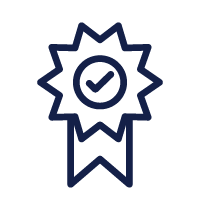
You’ve just passed all four parts of the CPA Exam?! Congratulations! You’ve successfully completed one of the world’s most difficult professional exams and you should feel exceptionally proud.
After you’ve celebrated, it’s time to look ahead at the home stretch of your journey toward licensure. After all, the hardest part is behind you, but there's still a little left. Understand the final steps you need to take and the requirements you need to fulfill to become a fully licensed CPA.
Steps to licensure after you pass the CPA Exam
If you’re wondering what to do after passing the CPA Exam, you should understand that you need to complete additional steps before becoming a licensed CPA.
Be sure to check your specific state CPA requirements, as each jurisdiction dictates its own process and requirements for licensure. However, these are the basic steps that you must follow:
- Complete additional education requirements
- Complete additional experience requirements
- Complete ethics requirements (if applicable)
- Send your application to the State Board of Accountancy
- Complete CPE
Education requirements
To sit for the CPA Exam, you were already required to prove completion of, at minimum, a four-year degree with an accounting or business concentration. However, CPA licensure after you passed the CPA Exam requires 150 semester hours (225 quarter hours) total of coursework, regardless of your state of residence. If you’re in a state that required only 120 hours (180 quarter hours) to take the CPA Exam, you may need to complete an additional 30 credit hours of accounting coursework.
For example, let’s say that you took the CPA Exam in Pennsylvania and plan to apply for licensure in this same state.
You needed for the CPA Exam:
- 120 semester hours (180 quarter hours) in post-secondary education
- 24 semester hours (36 quarter hours) in accounting, audit, finance, business, or related courses
Now, to apply for licensure, you need:
- 150 semester hours (225 quarter hours) total in post-secondary education
- 24 accounting-related credits already earned, plus an additional 12 credit hours (18 quarter hours) in accounting, audit, finance, business, or related courses1
This means that, after you pass the CPA Exam, you would need to complete an additional 30 semester hours of post-secondary education, at least 12 of which are in accounting-related courses.
If you’re wondering how to get 150 hours for CPA licensure, you have multiple options, including:
- Go to grad school.
- Take classes at your community college.
- Take College Level Examination Program (CLEP) exams.
Experience requirements
Like education requirements, each state defines the experience needed for CPA licensure. However, all states do require relevant professional accounting experience—many at least one year, under the supervision of a licensed CPA.
Let’s go back to the example of a CPA candidate in Pennsylvania. To be eligible for licensure, you must complete:
- No less than 1,600 hours of qualifying work experience over 12 full months
- Experience must be completed within the 60 month-period preceding license application
- Services involving accounting, attest, compilation, management advisory, financial advisory, or tax
- Work within government, industry, academia, or public practice1
Other states will have their own specifications; check your state’s CPA requirements to ensure that you’re aware of the experience you need to complete.
Ethics requirements
Not all states have of an ethics requirement for CPA licensure. However, many states do—and this ethics requirement varies in form between these states.
For example:
- Missouri dictates that CPA candidates must pass a board-approved ethics exam.2
- Louisiana asks candidates to prove their “good moral standing” by submitting character references.3
- Minnesota requires that you take and pass the AICPA Professional Ethics Comprehensive Course for Licensure within six months before or after you apply for your CPA license.4
Make sure you know if your state has an ethics requirement and, if so, what you need to do to complete it.
Send your application
After you’ve completed all your requirements for licensure, you have just one final step.
Gather your application materials and send them to your State Board of Accountancy. You’ll likely be able to do this process online, and you’ll have to pay the state-set application fee.
Complete CPE
After you’ve been officially licensed as a CPA, the real fun begins! You can exercise your license to apply for more advanced (and higher paying) job positions, and you can offer a wider range of services and specializations to your clients.
And considering all the work you’ve done to earn this door-opening credential, you should take extra care to maintain it in good standing by fulfilling your state’s Continuing Professional Education (CPE) requirements.
Each state will also dictate its own CPE requirements. Some are based on license renewal periods, while others run on their own schedules—but be sure that all CPAs will complete CPE to maintain licensure, no matter where you live.
Returning to our example of a CPA living in Pennsylvania, these CPE requirements stipulate:
- 80 hours of approved CPE over each biennial license renewal period
- At least 20 hours per year
- 4 hours must be in ethics
- 24 hours in Accounting and Auditing, if working in these areas5
Ethics CPE
Most states do include an ethics CPE requirement. Some states require a specific ethics course designed to meet their standards. These include, among others:
Many other states adhere to a standard AICPA Code of Professional Conduct CPE course to fulfill its ethics requirements.
Start your CPE
While CPE is required and you must invest your own time and money to get it done, this learning provides the exciting opportunity to hone your skills in the areas that most interest you.
If you want to drive your career into the analytics and data side of accounting, you could complete a Microsoft® Excel Fundamentals + Data Analytics Certificate, which would earn you 28 CPE credits.
If you work in tax services, take the opportunity to enroll in tax CPE to stay current on regulation updates and accurate for your customers.
Whatever your area of specialization—general accounting, audit, tax, information, or any other—you can find a CPE course that helps you grow your expertise and career in that area.
Featured
- https://www.pa.gov/en/agencies/dos/department-and-offices/bpoa/boards-commissions/accountancy-board/cpa-snapshot.html
- https://www.becker.com/cpa-review/missouri-cpa-requirements
- https://cpaboard.state.la.us/becoming-a-cpa/
- https://boa.state.mn.us/applicants.html
- https://www.nasbaregistry.org/cpe-requirements/pennsylvania









